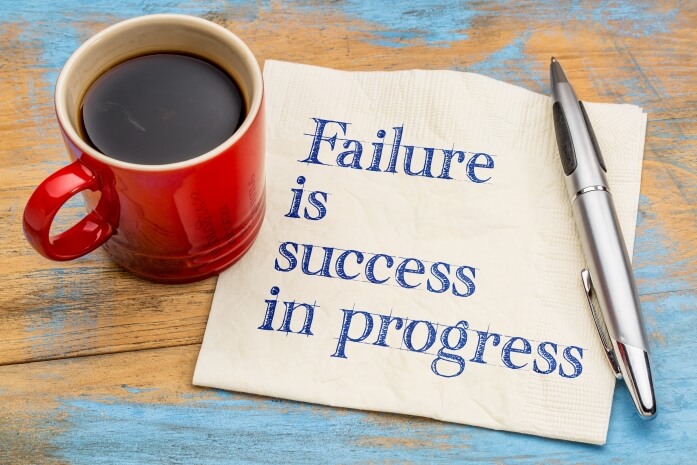The Secret of Ongoing Professional Development at Any Career Stage

People sometimes ask me whether there is a single, simple principle that will help everyone in the organization to learn and grow and improve over time, regardless of an individual’s position or level of experience. There is. But it may come as a surprise to you: embracing failure and embracing it quickly.
No matter where we are in our careers, we need to learn to embrace failure. Everyone’s going to fail – it’s a critical part of the learning process. You probably failed when you were a kid, learning how to ride a bike. Or maybe you failed the first time you took your driver’s test. Most video games are designed to get users to learn from failure. Think about it: there are no instructions, you just figure it out as you go – which means you fail. We all fail in ways big and small, in all the different roles that we take on throughout each day. Failure is going to happen! That’s a fact of life. The big question is whether we are failing within boundaries we’ve identified for ourselves ahead of time, and whether we are learning from the failures we experience, and thereby growing and succeeding.
If you’re in a position of leadership, it’s vitally important to understand this point, as well as constantly look for ways to protect people’s self-esteem. Sometimes people on your team will tend to stop trying when they fail. They may confuse failure within a certain role (salesperson, say) with failure as a person. We need to find ways to remind them that how they perform within a role is completely different than their self-concept. Because if they confuse the two, their self-esteem will take a hit each and every time they fail, and their growth and development will suffer.
Your salespeople, and you as a sales leader, should all be comfortable seeing yourselves as a “I-10” – meaning your identity, or your self-concept, shows up as 10 on a scale of 1-10, regardless of how you happen to perform within any given role. That doesn’t mean you’re arrogant, but it does mean you have a healthy self-concept. It means you understand that failure within the role you have taken on is ultimately a positive. Failure’s not something you fear or try to conceal. It’s something you can learn from. In fact, it’s the very best experience to learn from.
Within any given role – parent, salesperson, sales leader, golfer, whatever – do we want to perform at a level of 10 out of 10? Of course! But we have countless different roles in our lives. Are we going to be a 10 on everything? No. And if we happen to have a rough day in one of our roles, and we show up at a 2 in that role, we need to understand that that doesn’t have anything to do with who we actually are. Our self-concept, our sense of self-worth, still shows up at a 10. The only thing that’s different is we’ve just found an area where we can improve. That’s absolutely essential. It’s something to notice!
The key to sustaining ongoing professional development within any role, regardless of where we are right now in our career or where we want to go next, is understanding that we can only perform in our professional role in accordance with our self-concept, or our sense of self-worth. People who consistently see themselves as I-10 don’t run away from failure. They know they have to risk failure in order to attain success. They always have a score of 10 out of 10 in terms of self-concept that they can build from, and in order to succeed within the role, they risk failure, so they can learn from that failure and move forward. They welcome constructive feedback, so they can search out why things aren’t working.
This is a long-term learning process, one that never ends. Risk, failure, and success always go together. If we and our people make sure that we consistently see ourselves as I-10, we will take appropriate risks, and we will fail … and that will be okay, because we’re going to be in a position to learn from that failure. Once we understand that much, we understand the secret of sustaining ongoing personal development over time.
Check out my video to learn more about how failure can help you grow and develop in your career.







